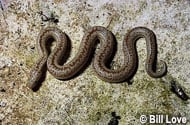Rosy Boa
Found from Southern California east to south-central Arizona and then into northwestern Mexico, including Baja California.
Many workers now place this species in the genus Charina along with the rubber boa.
Long considered one of the easiest snakes to care for, rosy boas are at home in a small, dry terrarium with minimal decorations. An adult or small group can be kept in a 10-gallon or 20-gallon terrarium or similar plastic box on a substrate of shredded aspen, sand or coconut fibers. The substrate should be at least 2 inches deep to allow the snake to burrow. Provide a branch or other decoration as a hiding spot. Water should be presented only two or three times a week in a shallow bowl and the substrate must not be allowed to become wet. Maintain a temperature of 75 degrees Fahrenheit, dropping a bit at night, but give the snake an undertank heating pad or a basking light in one corner for a localized higher temperature of 90 to 100 degrees. Although nocturnal in nature, many captives learn to become active during the day and are easy to handle.
Feeding is not a problem with adults, which will commonly take two or three hopper or small adult mice once or twice a week. Newborn specimens may not feed for several weeks before taking their first pinky mouse and some may require a gecko or other small lizard as their first meal.
This species is widely bred in captivity in a variety of color forms or subspecies.

